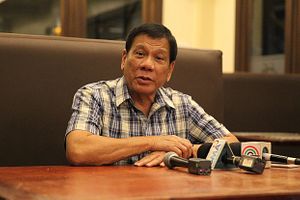The long-running insurgency of the Muslims of Mindanao and Sulu archipelago has been a pressing national security concern for the Philippines. There several peace agreements have been settled but implementation has typically been an issue. The latest agreement, the Bangsamoro Peace Process between the Philippine government and the Moro Islamic Liberation Front (MILF), seeks to establish a Bangsamoro Autonomous Region through the passing of the Bangsamoro Basic Law (BBL).
Philippine President Rodrigo Duterte vowed to ensure that the Bangsamoro Autonomous Region would be established during his term in office. But, since the draft of the BBL was submitted in 2017, Congress has yet to pass the proposed law that will create a Bangsamoro Autonomous Region. Duterte lobbied for support for the long-stalled BBL for months.
Notwithstanding any progress made toward the BBL, there are reasons to believe that the complexity of Philippine politics means that peace will be slow in coming and the solution will require extensive political change.
First, some constitutional experts have highlighted that certain provisions of the BBL would go against the Constitution of the Philippines. Senate President Aquilino Pimentel III has also asked the Malacañang to look into the draft, as the proposed BBL might contain unconstitutional provisions. Nevertheless, the Bangsamoro Transition Commission (BTC) assured the Senate in January that the BBL aligned with the constitution.
Even so, there may still be a cause for concern. For example, it remains unclear whether a Bangsamoro police force would be established under the Bangsamoro government. The constitution explicitly provides for “only one police force” to be managed by “a national commission.” To that end, some experts argued that BBL would create a substate of equal level with the central government.
Even if federalism does take place in the Philippines, it remains to be seen whether the Bangsamoro police would be providing security or behaving more like militias. After all, this is a region beset with severe security and crime issues. Interested parties would not want to see another actor deepening insecurity in Mindanao.
Second, the peace talks are only taking place between the MILF central command and the Philippine executive. There are many other stakeholders involved — like the Lumads and local clan leaders — but they are not included. Excluded groups have the potential to scupper a deal for which they have not been adequately consulted.
The Lumads’ main concern revolves around ancestral domains; they oppose the inclusion of their areas in any peace deal struck. One should take note that the Moro and Lumad claims to land are not entirely mutually exclusive. Therefore, if the Bangsamoro Autonomous Region involves changes to any of the Lumads’ positions, they would definitely resist.
The Lumads are also one of the most marginalized group in Mindanao. At the same time, the Lumad resistance has not amounted to a significant insurgency. If the Lumads feel more marginalized after the implementation of the Bangsamoro Autonomous Region, we should not be surprised if they escalate their resistance.
Third, it is also useful to note that clan leaders in Mindanao are important power brokers who feed off the Christian-Muslim division to strengthen their own political power. As such, there may be a certain interest in ensuring that the conflict continues. Even supposing that the Bangsamoro Autonomous Region does come into being, the nexus of clan interests could cause it to be a watered-down version.
Philippine Politics
The Philippine state is an unstable coalition of interests where political representatives belong to family-based oligarchies in the provinces and islands. Political representatives, therefore, represent their family interests in the state. This system limits the ability of the president in pushing for a bill or reform opposed by key members in the House of Representatives. An example is the deliberation over the BBL, where the House of Representatives happens to be the main bottleneck.
Duterte has vested interests in bringing about federalism in the Philippines; the BBL and the Bangsamoro Autonomous Region are a part of that endeavor. Avoiding embarrassment for Duterte means passing the BBL. Nevertheless, given the highly personalized politics of the Philippines, the question is whether there will be sustainability to the peace implementation after Duterte steps down as president.
It is crucial that the latest peace deal succeeds, but in the event that it does not, we are likely to see disgruntled followers of the MILF and Moro National Liberation Front (MNLF) join forces with more radical groups such as the Bangsamoro Islamic Freedom Fighters (BIFF) and Maute Group. That is on the assumption that the MILF and MNLF will not be disbanded.
More importantly, if the Philippines fails in this opportunity to bring about peace under this deal with the MILF, there is hardly any group left for the next round of talks.
Eugene Mark is a Senior Analyst with the S. Rajaratnam School of International Studies (RSIS) in Singapore.

































